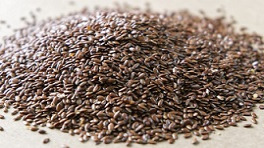Flaxseeds offer numerous health benefits. Flaxseeds are seeds from the flax plant (Linum usitatissimum) cultivated in temperate regions of the world for both food and fiber. They come in two varieties, the brown color flaxseeds, or the yellow color flaxseeds, with both varieties having similar nutritional properties.
Flaxseeds can be milled to give flaxseed meal or can be crushed to extract oil called flaxseed oil for both human and animal consumption. Flaxseed meal can be safely added directly to meals during preparation, pastries, and smoothies as desired. They contain high levels of protein (18.3g/100g), fiber (27.3g/100g), calcium (255mg/100g), phosphorus (642 mg/100g), magnesium (392mg/100g) as well as other polyphenols that accounts for their numerous health benefits (1).
Flaxseed has the following health benefits when consumed regularly.
- Boosts body immunity. Flaxseed is rich in dietary fiber (both soluble and insoluble), which is the part of a plant that is not digested by the human digestive enzymes. They therefore end up in the large intestines/colon, where they are fermented by bacteria, supporting the growth of healthy bacteria in the gut. A large population of healthy microbiota helps fight off pathogenic bacteria that cause disease, thus boosting the immunity of the body. This is one of the many health benefits of flax seeds. (2)
- Prevents constipation. Insoluble fiber draws water into the intestines, increasing bowel movements and stool volume, all of which help to prevent constipation (3).
- Lowers blood sugar levels. Soluble fiber slows down the digestion of carbohydrates, consequently slowing down sugar absorption in the blood, which result in lower blood sugar levels. As such the consumption of whole flaxseed meal can be beneficial to individuals suffering from type 2 diabetes (4).
- Aids weight loss. Soluble fiber slows down digestion and increases satiety making you feel full quickly. Increased satiety feeling sends impulses to your brain to stop eating, as such you eat less. Less calorie intake, will lead to weight loss, making a flaxseed meal a great addition to the diet for those who want to lose weight (5).
- Reduces risk of coronary heart disease. Fiber reduces the levels of low-density lipoprotein (LDL) cholesterol in the body, which is the bad cholesterol, associated with the onset of coronary heart disease. Fiber has been demonstrated to bind to bile acids increasing their excretion within 24 hours post consumption. Bile acids facilitate both the digestion and the absorption of lipids and cholesterol (6).
- Protects the body from cancer. Flaxseed contains lignans, which are large polyphenolic compounds that have anti-cancer properties. They prevent cancer by impeding the enzymes implicated in hormone metabolism and obstructing the growth and the spread of tumor cells (7).
- Boosts heart health. Flaxseed is an exceptional source of omega-3 fatty acid (alpha linolenic acid – ALA) which has anti-inflammatory, anti-depressant, and neuroprotective properties. Including the health benefits of flax seeds ALA reduces the production of proinflammatory cytokines, thereby reducing inflammation that plays a crucial role in the pathogenesis of atherosclerosis, a risk factor for cardiovascular disease and stroke (8). They also lower the cholesterol levels in the blood and prevent the deposition of cholesterol in the blood vessels of the heart (9).
Adding flaxseed to your diet, is therefore a go for considering all the wonderful health benefits discussed above. It should however be noted that whole flaxseed meal contains significantly more fiber than flaxseed oil, so if you are looking forward to enjoying all the benefits of a fiber rich diet, you should go for whole flaxseed meal.
REFERENCES
- FoodData central. (n.d.). Retrieved March 25, 2022, from Usda.gov website: https://fdc.nal.usda.gov/fdc-app.html#/food-details/169414/nutrients
- Makki, K., Deehan, E. C., Walter, J., & Bäckhed, F. (2018). The impact of dietary fiber on gut Microbiota in host health and disease. Cell Host & Microbe, 23(6), 705–715. doi:10.1016/j.chom.2018.05.012
- Akbar, A., & Shreenath, A. P. (2021). High fiber diet. In StatPearls [Internet]. StatPearls Publishing.
- Fardet, A. (2010). New hypotheses for the health-protective mechanisms of whole-grain cereals: what is beyond fibre? Nutrition Research Reviews, 23(1), 65–134. doi:10.1017/S0954422410000041
- Ferrari, N. (2015, February 17). Making one change — getting more fiber — can help with weight loss. Retrieved March 25, 2022, from Harvard Health website: https://www.health.harvard.edu/blog/making-one-change-getting-fiber-can-help-weight-loss-201502177721
- Naumann, S., Haller, D., Eisner, P., & Schweiggert-Weisz, U. (2020). Mechanisms of interactions between bile acids and plant compounds-A review. International Journal of Molecular Sciences, 21(18), 6495. doi:10.3390/ijms21186495
- The benefits of flaxseed. (n.d.). Retrieved March 25, 2022, from WebMD website: https://www.webmd.com/diet/features/benefits-of-flaxseed
- Blondeau, N., Lipsky, R. H., Bourourou, M., Duncan, M. W., Gorelick, P. B., & Marini, A. M. (2015). Alpha-linolenic acid: an omega-3 fatty acid with neuroprotective properties-ready for use in the stroke clinic? BioMed Research International, 2015, 519830. doi:10.1155/2015/519830
- Kajla, P., Sharma, A., & Sood, D. R. (2015). Flaxseed-a potential functional food source. Journal of Food Science and Technology, 52(4), 1857–1871. doi:10.1007/s13197-014-1293-y
